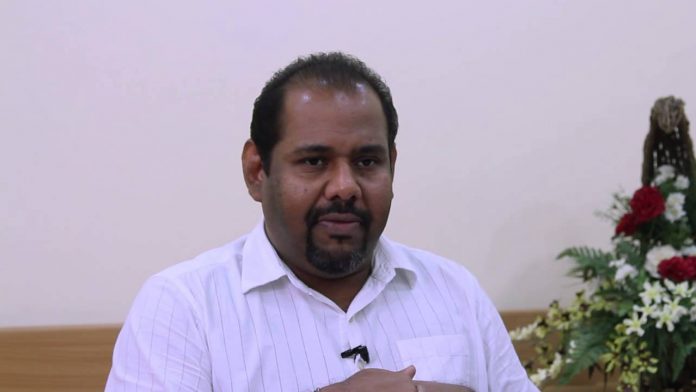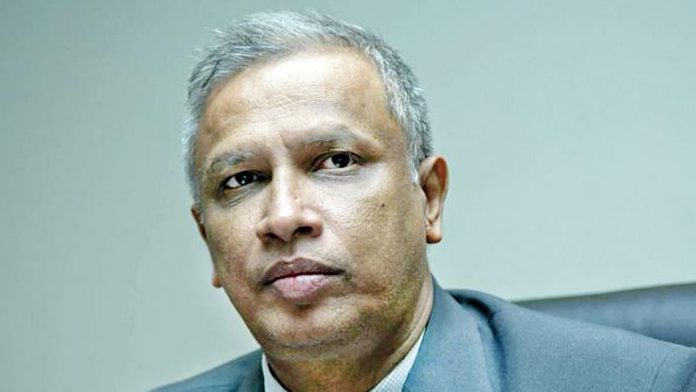Tamil parliamentarians from the TNA (Tamil National Alliance) and the TNPF (Tamil National People's Front) spoke out against the 20th Amendment today as it passed with a two-thirds majority needed.
The latest count states that 156 parliamentarians voted for the amendment with 65 votes against.
The measure will greatly expand the powers of the executive presidency whilst also removing the ability of parliament to act as a check and balance. UN High Commissioner for Human Rights, Michelle Bachelet, who expressed concern that it would "negatively impact the independence of key institutions, including the National Human Rights Commission".
TNFP - Gajendrakumar Ponnambalam

Leader of the Tamil National Peoples’ Front (TNPF) Gajendrakumar Ponnambalam gave a vocal opposition to the 20 Amendment maintaining that it maintained a persistent “refusal to recognise that Sri Lanka is a plurinational country, and there exists several nations within this country, the Sinhalese, the Tamils, and Muslims”.
During his speech, Ponnambalam sought to answer the question “why is the country facing this situation?”
He maintained that he was not surprised nor was his party. To Ponnambalam the 17th and 19th amendments were anomalies, breaks from the direction in which that stated had been travelling for the last 72 years, towards becoming a centralised “Sinhala Buddhist hegemonic state”.
Soulbury Constitution
In his speech, he remarked on the Soulbury Constitution, the first constitution held by Sri Lanka after the British left, and in particular on Article 29 (2) which “prohibited Parliament from conferring on any community or religion a benefit that was not conferred on other communities or religions”.
In January 1936, responding to an advancing all Sinhala board of Ministers, Tamil politicians rose up against what they perceived as “a nationalist Sinhala hegemonic move to usurp state powers to one community”.
“What was foremost in the mind of the Soulbury commission”, remarked Ponnambalam, was how “ethnic harmony […] could be adhered to”. The commission aimed to “encourage a national consciousness” and “meet the requirements of a plural society”.
Article 29 (2), he maintains, asked non-Sinhala Buddhists to confide faith in remaining in Sri Lanka. This was coupled with other measures such as the establishment of a second chamber and the senate; maintain the independence of the judicial service commission and public service commission as well as the judicial appeals to the privy council. All of these were “measures to safeguard the non-Sinhala Buddhist”.
This article was understood as a social contract between different communities in Sri Lanka, it was the “bedrock on which Sri Lanka got independence”, stated Ponnambalam. This would soon dissipate as measures wear taken to further grasp power within the Sinhala community such as the official language act and Ceylon Citizenship Act. This would lead to the solidification of Sinhala control in 1972 under which “the Sinhala Buddhists became the custodians of the state”.
1972 and 1978 Constitution
The 1972 constitution was the first time in which Sri Lanka “was declared as a unitary state, article 29(2) was removed”; there was the “removal of appeals to the privy council; removal of the second chamber; all consistent with the direction that Sri Lanka was becoming a Buddhist state but at the same time it was centralising”.
The 1978 constitution was Sri Lanka’s second republican constitution and passed on the premise that the country required “strong leadership” for “rapid economic development”.
“the executive would be unafraid to take correct but unpopular decisions, but in reality, the 78 constitutions entrenched the Sinhala Buddhist character of the state”, noted Ponnambalam.
A two-thirds majority be required to alter it as well as a referendum. The unitary character of the state and that Buddhism was given the foremost place were cornerstones of entrenchment. However, Ponnambalam states that after the 1978 constitution, “after the Jayewardene and Ranil Premadasa era, that there came consensus from both sides of this house, quite apart from the fact that the Tamils and the non-Sinhala Buddhists were all ignored from this debate”. This was that the executive presidency “authoritarian in character” and “must be abolished”.
A reversal towards democracy
“That was a small change, there was a moment, where the Sinhala nation itself took a step back and began to question the character of the state, it wanted to democratise, it was trying to rebel against authoritarianism and that was that moment of the 17th and 19th amendment” stated Ponnambalam.
These amendments rolled back the power of the executive presidency and create checks and balances on his power. Ponnambalam further maintained that what motivates this tendency towards authoritarianism is the persistent denial plurality.
It is this and “the need to centralise that is creating this monster, and it is this monster that is today, now destroying your own democracy”, Ponnambalam said.
He further warned that this was the “beginning of a slide that will ultimately lead to not just authoritarianism but dictatorship”.
He concluded his speech stating:
“At that time you will ask, you will search and you will find, that the non-Sinhala Buddhists, particularly the Tamils stood with the Sinhala people in refusing to agree to a systematic dismantling of democracy, of the Sinhala nation itself.
And we hope, that in that same spirit, you will begin to change your attitudes towards the Tamils and the Muslims and create a plurinational state”.
TNA MP - M A Sumanthiran

In opposition to the amendment, TNA MP M.A. Sumanthiran drew criticism on the very MPs who had proposed to repeal the 18th amendment and bring in the 19th amendment but was not actively trying to remove the 19th and “effectively to go back to the 18th amendment”.
He notes that there are only two amendments that had more than 200 members voting for it;
“The 17th amendment was passed with only one-member abstaining […] and the 19th was passed with only one member voting against it”.
He maintained to the Sri Lankan MPs that this vote for the 20th amendment was a “betrayal for the people who voted” for them.
He further castigated members of the Sri Lankan Muslim Congress who voted in favour of the amendment remarking that the leader of the Muslim Congress had earlier come to the Supreme Court as an act of atonement for enabling the 18th amendment.
“Once you have said that that is wrong, then don’t go back to that” Sumanthiran stated.
The Executive Presidency
Commenting on the executive presidency, he remarks that since the 1990s there has been a consensus for its abolition, with then-President Chandrika Bandaranaike Kumaratunga pushing for abolition in 1994.
“The UNP, which had introduced the executive presidency”, Sumanthiran notes, further passed a resolution in 1996 to abolish its position however in 2000 when it was brought for a vote the UNP opposed it.
“The stated reason was that the exec presidency was not being abolished immediately, that it was being retained for her [Kumaratunga’s] ten years in office”.
In 2015, Maithripala Sirisena vowed to the Tamil people that he would abolish the executive presidency and whilst he did not do this he passed the 19th amendment which “was the first step in cutting down presidential power”. This Sumanthiran maintains was intended only to be “a temporary solution until” the executive presidency was dissolved.
In the last election, Sumanthiran maintains that Rajapaksa was not given the mandate to “strengthen the executive presidency or even to retain it, it was never articulated in that way, what was stated was that the 19th amendment was a problem and we’ll get rid of it”.
Sumanthiran argues that if there were flaws in the 19th amendments this could have been amended without the country reversing in the “direction of autocracy”.
“There are certain fundamental principles in democratic rule that one must observe, separation of powers is one key aspect of that”, he adds.
Whilst the 19th amendment restored some power to parliament and the judiciary, they have “been drained back into the slot of the executive presidency”, Sumanthiran stated.
Dissolution of parliament
Sumanthiran further castigated the President’s actions to dissolve parliament for 52 days maintain that all of the Supreme Court judges had ruled it illegal.
“No questions it was a blatantly illegal act”, he stated.
The 20th amendment further enables the President to operate with limited parliamentary scrutiny and to dissolve parliament after a year,
The current provisions of the constitution prohibits the dissolution of Parliament until six months before the legislature’s give term ends.
Sumanthiran maintained throughout his speech that;
“Democracy is messy, we know that[…] Discussion and deliberation take time, sometimes its costly, but that is democracy[…] That’s how you know that it’s the peoples will that eventually materialises”
